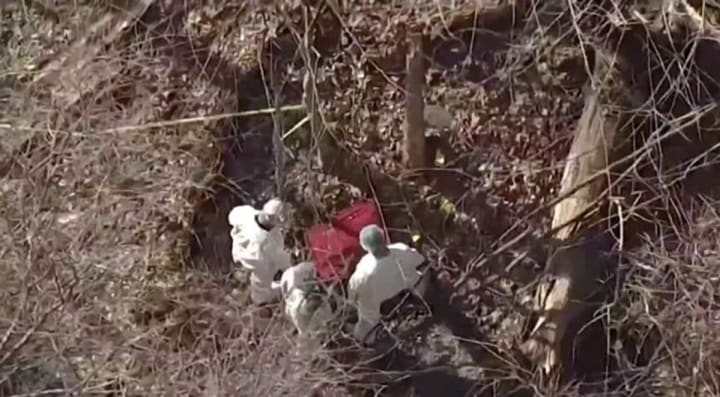Suffocated in a Suitcase — The Horrible Death of Valerie Reyes
Ex-boyfriend sentenced to 30 years for her death

Javier Enrique Da Silva Rojas and Valerie Reyes were in a relationship that lasted a mere three months and ended in April 2018. Valerie told friends and family that Da Silva Rojas was just more invested in the relationship than she was and it caused tension between them.
After the breakup, Da Silva Rojas continued to contact Valerie but had stopped in September 2018 after letting her know he wanted to reimburse her for mistakenly using her debit card information. When Valerie refused to deal with him directly and asked a friend to handle the reimbursement, he seemed to get the message. Four months later, that would prove not to be the case, after all.
On the evening of January 28, 2019, Da Silva Rojas rented a car in Flushing, New York, and drove to Valerie’s residence in New Rochelle, New York. He arrived there in the early morning hours of January 29, 2019. Da Silva Rojas switched his phone to airplane mode before entering Valerie’s home in a clear effort to conceal his presence there. It is unknown whether Valerie let him in or if he pushed his way in after she opened the door but, at some point after his entry, there was a violent altercation between the two. This resulted in Valerie suffering severe head trauma that included bruising on her face and a large hematoma to her forehead.
While Valerie was incapacitated, Da Silva Rojas covered her mouth with several layers of packing tape and bound her feet and hands with the same tape before putting her into a suitcase. He put the suitcase in his rental car and drove to Greenwich, Connecticut, where he dumped it in a wooded area off Glenville Road with Valerie still inside. At this point, the callous killer had no idea whether his victim was alive or dead. On the way back to Queens, after using it to access her bank information, Da Silva Rojas tossed her cell phone off the Whitestone Bridge.

In the days that followed, Da Silva Rojas used Valerie’s debit card to make ATM withdrawals amounting to $5,350 from her bank account. He also sold an iPad he had stolen from her apartment.
Valerie worked at a bookstore in Eastchester, New York. As an avid reader, it was a job she loved. She also enjoyed her time off on Sundays, which she regularly used to catch up with her family.
On January 30, 2019, Valerie was reported missing to the New Rochelle Police Department after not meeting her mother for a weekend shopping trip and missing work for a couple of days without calling in.
Less than a week later, on February 5, 2019, her body was found in a red suitcase alongside a public road in Greenwich, Connecticut. The Connecticut Medical Examiner’s Office determined Valerie’s cause of death to be homicidal asphyxiation.
In the days before her murder, Valerie had told her mother, Norma Sanchez, that she feared someone was going to kill her. Valerie had previously suffered from mild depression and was clearly upset by whatever was happening in her life. She was experiencing anxiety attacks as a result of her concerns. It was unclear why she believed this and didn’t want to tell her mother anymore about it, so her mother decided to wait and discuss it with her further during an upcoming shopping trip they had planned. Unfortunately, Valerie disappeared before her mother was able to speak with her further about it.
After Valerie was reported missing, it was discovered that someone had been using her bank card to withdraw cash from her account. The surveillance footage from the ATMs that were used showed a man wearing a black hoodie accessing her account. Also visible in one of the videos was the vehicle he was driving, which traced back to the rental vehicle Da Silva Rojas had hired for his trip to Valerie’s apartment and then, later, rehired long enough to thoroughly clean at a nearby car wash before returning it.
Police arrested Da Silva Rojas and were able to match his DNA to the handle of the suitcase that had by then been recovered and to material found under Valerie’s fingernails. During his interrogation, the killer claimed that he had visited Valerie on the night of January 28. Despite not having been together for more than nine months, he claimed they had rough sex during which Valerie had fallen and hit her head. He’d said he panicked and bound her with the tape and placed her in the suitcase for disposal.
Investigators on the case didn’t buy it. Why had he disabled his phone’s location data before entering? Why hadn’t he simply called an ambulance when she was injured? She had not died from the head wound but from suffocating behind multiple layers of tape in the suitcase where he’d placed her and left her to die. It is unclear if Valerie was ever truly conscious at any point in the suitcase. Da Silva Rojas had no answers for any of his actions other than trying to play it off as his being in a state of panic.
His defense attorneys, the public defender team of Mark DeMarco and Jason Sher, tried to lessen Da Silva Royas’ sentence by portraying him as an otherwise decent man with no criminal record and a good reputation among those who knew him. They claimed he was forced from his middle-class life in Venezuela when the country’s economy collapsed, creating food shortages and violent street protests that were dealt with by force from the government.
They said that Da Silva Rojas was forced to drop out of college in 2017 and flee to the U.S. with only $600 to his name. He had kept his nose clean and worked with a cleaning company before getting a job at the restaurant where he worked prior to his arrest. Though they didn’t try to excuse the severity of his crime, they did try to explain it away by saying he had succumbed to stress, being separated from his family, and drugs he had begun using. They referred to him as “a broken man, someone who is sincerely sorry for his actions [and] understands the horrific nature of his conduct.”
Eventually, a plea arrangement was reached in the case. On February 4, 2020, Da Silva Rojas pleaded guilty in front of U.S. District Judge Vincent Briccetti to one count of kidnapping resulting in death.
In a statement to the court during sentencing Da Silva Royas showed remorse for his actions:
“No words can express how repulsed I am by the acts I committed. I will never forgive myself for that. I cannot ask (her family) to forgive me because I don’t deserve it. I would like them to know I’m very sorry.”
One friend of Valerie’s, Naomi De Jesus, wrote a victim impact statement that describes a clever and spirited young woman who fought to overcome depression.
“Anyone she has ever met she has left an impact on them. She was one of the most selfless and nonjudgmental person [sic] I have ever known. Even during her hardest times, she was always there for her friends whenever we needed her. It breaks my heart knowing she is no longer with us.”
Valerie’s mother told the White Plains federal court that her daughter was the light of her life and best friend. She castigated Da Silva Rojas, calling him a “selfish, greedy, soulless person” who deserved “nothing but pain and rejection.” Da Silva Rojas sobbed quietly as she spoke.
On September 23, 2021, 25-year-old Javier Enrique Da Silva Rojas was sentenced to 30 years in prison for kidnapping resulting in death and unlawfully transporting 24-year-old Valerie Reyes from New Rochelle, New York to Connecticut. Because he is a Venezuelan citizen present in the U.S. illegally, authorities had indicated that he will be deported once his sentence is completed.
The judge told Da Silva Rojas:
“What you did to this woman was sickening. Anyone who could do such a thing is not a good person, by definition. Anyone who can do a thing like that is an evil person. Justice requires an evil deed be punished by a lengthy prison sentence.”
U.S. Attorney Audrey Strauss stated:
“Javier Da Silva committed a horrific kidnapping that resulted in the death of a young woman. In the days after, he used her ATM card to empty her bank account and then attempted to cover up the evidence of his conduct. Valerie Reyes, the victim of this crime, was in the prime of her life when it was senselessly ended by Da Silva’s abhorrent act. Those who commit violence, especially those who kill, will not escape justice.”
It remains unclear why Da Silva Rojas killed Valerie, but one indisputable fact is that her last moments must have been filled with fear and horror we can’t imagine. Thirty years is not nearly enough to make up for the disregard her killer showed for her life. Valerie Reyes received some justice, but not nearly all the justice she deserved.
Da Silva Royas will be out of prison before he is fifty-five years old. Once his time is served, one must fear for the women of Venezuela or wherever he goes who may not be aware of his crime and cross his murderous path in the future.
About the Creator
A.W. Naves
Writer. Author. Alabamian.






Comments
There are no comments for this story
Be the first to respond and start the conversation.